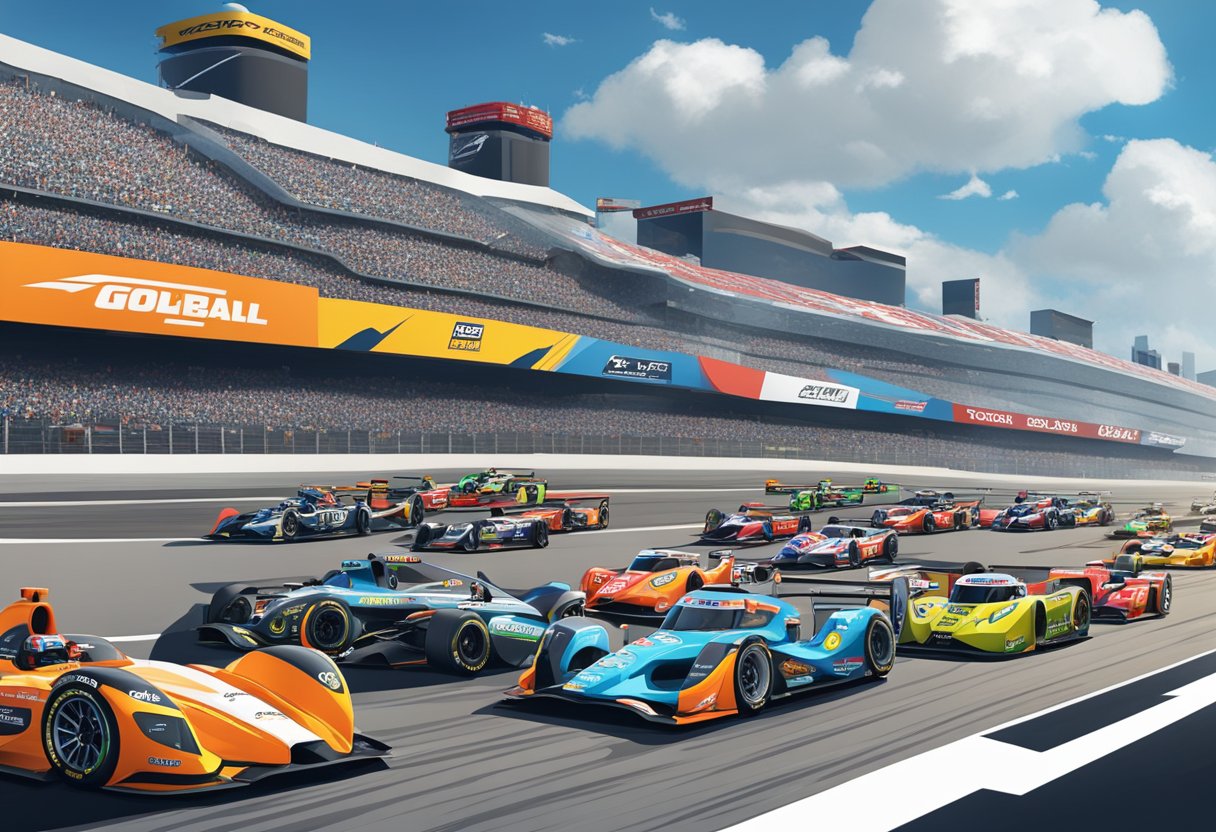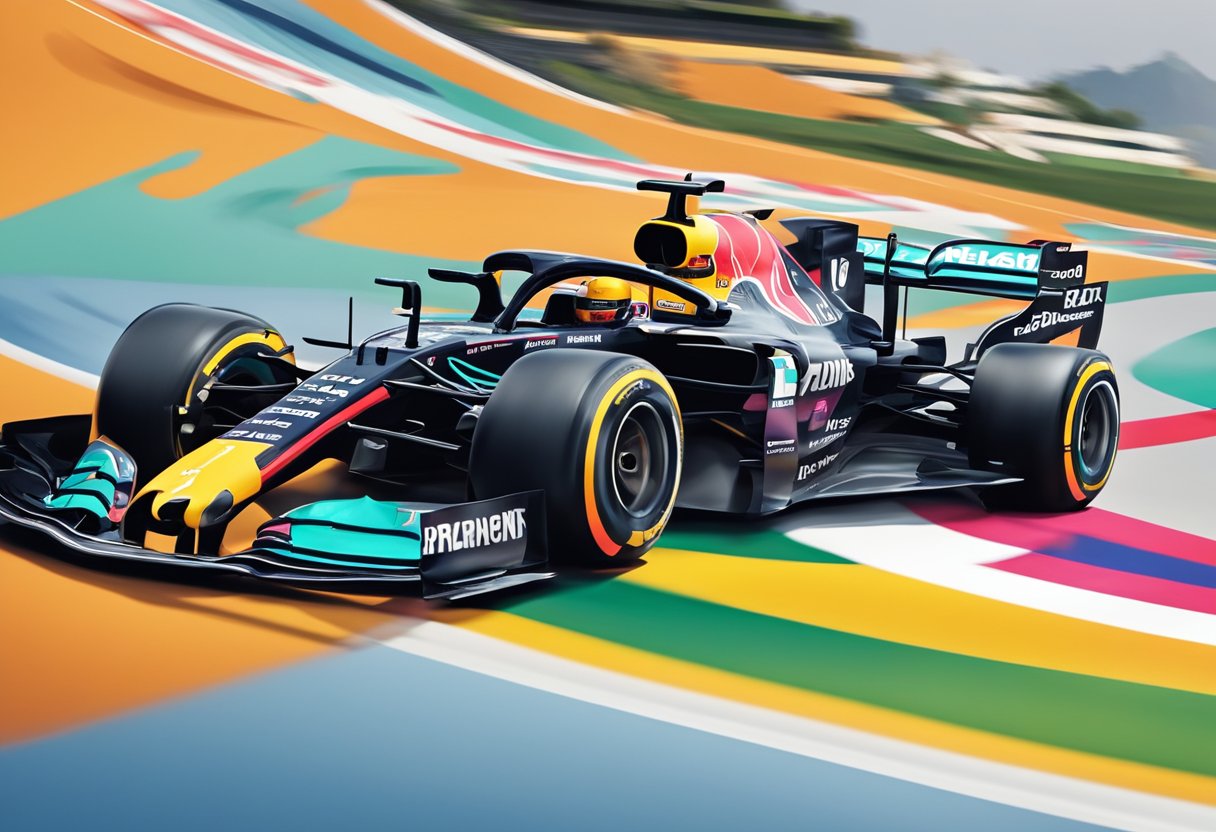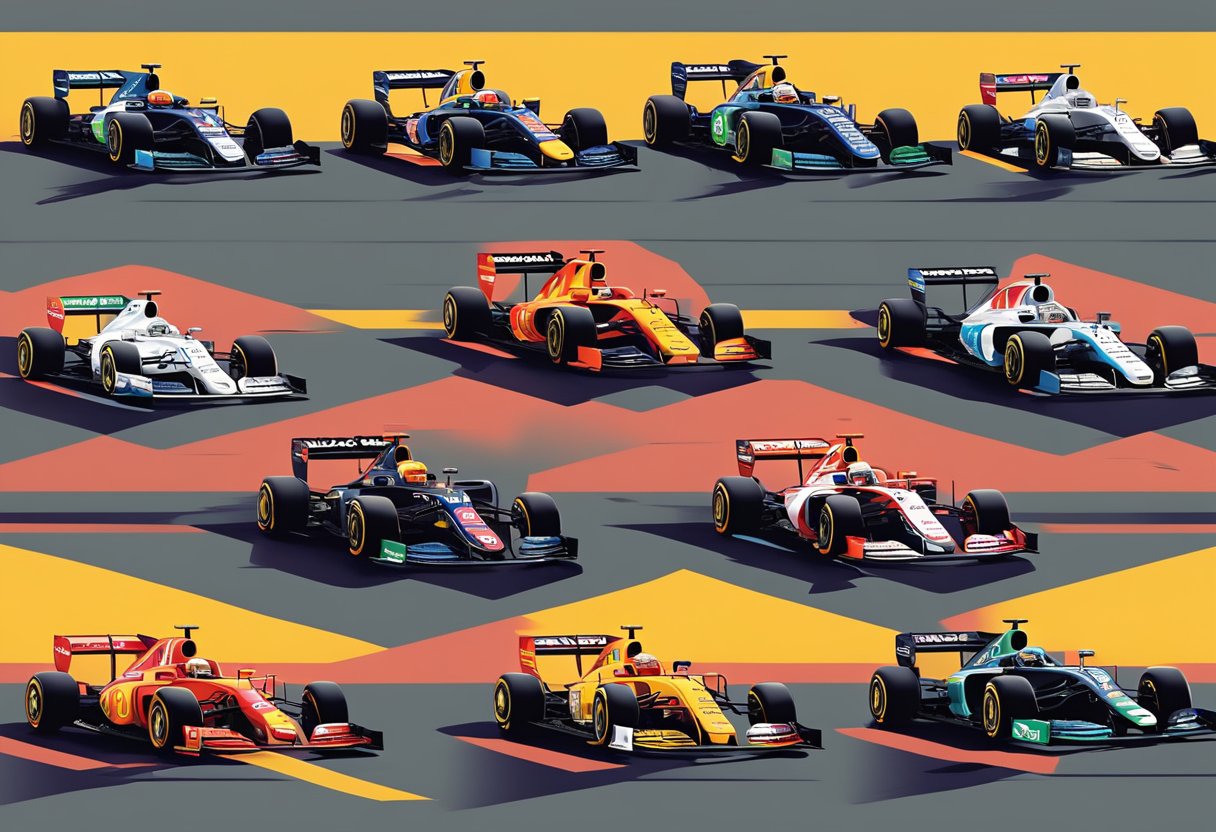Formula 1’s appeal to major global brands has hit new heights in 2024, with companies investing heavily to associate their names with the exhilarating world of motorsport. The team’s liveries are no longer just about colours and patterns; they’re billboards speeding at over 200 mph, showcasing some of the world’s most influential corporations. Partnerships between F1 teams and sponsors have evolved into sophisticated marketing ventures, with brands seeking to leverage the sport’s growing global fanbase.
The dynamics of team sponsorship have seen a shift, as traditional automotive-related companies now share space with emerging tech firms and unconventional businesses eager to exploit F1’s marketing potential. Oracle’s prominent sponsorship of Red Bull Racing exemplifies the immense value placed on these partnerships, with reports suggesting they have committed approximately $90 million for the 2024 season. Similarly, the paddock buzzes with talk of McLaren’s impressive roster of 47 sponsors, a testament to F1’s profitability and the effectiveness of its global marketing platform.
Key Takeaways
- Global brands are investing heavily in F1 sponsorships, drawn by the sport’s increasing popularity and marketing reach.
- Sponsorship deals have diversified, with tech firms and various sectors now prominently featured alongside traditional automotive sponsors.
- The scale and scope of these sponsorships reflect the sport’s commercial success and pivotal role in shaping marketing strategies.
Evolution of Sponsors in Formula 1

Sponsorship in Formula 1 has undergone significant changes from the inception of the sport, transitioning from small-scale branding to multimillion-dollar partnerships that shape the financial landscape of teams.
Historical Big Brands
Historically, big brands in the Formula 1 ecosystem consisted mainly of tobacco companies. They dominated the scene with logos emblazoned across cars and tracks alike. The significant milestone year was 1968, when substantial sponsorship agreements began, evolving the financial framework of the sport.
Modern Era and the Growth of Sponsorship
As tobacco advertising faced global crackdowns, Formula 1 welcomed a surge of sponsors from various industries. Technology and software providers swelled the ranks of traditional sponsors. This shift has resulted in the sport’s increasing profitability, supported by the budget cap that ensures sustainability and financial viability for teams.
Changing Landscape: Tobacco to Technology
The recent sponsorship landscape is dominated by technology giants instead of the tobacco behemoths of the past. Companies such as Oracle and BYBIT have become prominent, pumping tens of millions into the sport. They reflect the evolution from a tobacco-laden past to a future focussed on digital transformation and innovation in Formula 1.
Leading F1 Team Sponsors

The 2024 Formula 1 season exhibits an impressive range of partnerships between leading teams and global corporations. These alliances are pivotal for financial backing and technological advancements in a sport that places high demands on performance and innovation. Each team’s sponsorship portfolio is a testament to their brand’s strength and appeal in the marketplace.
Ferrari’s Corporate Alliances
Ferrari, the iconic Italian racing team, has consistently maintained a powerful presence in F1 with substantial corporate alliances. Their collaborations with longstanding partners—Shell for fuel technology and Kaspersky for cybersecurity—are cornerstones of their operation, boosting Ferrari’s competitive edge.
Mercedes’ High-Profile Partnerships
Mercedes leverages its High-Profile Partnerships to propel its F1 endeavours—counting PETRONAS for advanced lubricants and INEOS as part of its strategic partners. Their commitment showcases the synergy between the German powerhouse’s precision engineering and its sponsors’ innovative contributions.
Red Bull Racing’s Collaborative Ventures
Red Bull Racing, known for its aggressive marketing and competitive spirit, enjoys a substantial sponsorship with Oracle, contributing a massive £72 million. This Collegial Venture is critical to Red Bull’s strategy, enabling them to push the boundaries of the sport both on and off the racetrack.
McLaren’s Diverse Portfolio
McLaren differentiates itself with a Diverse Portfolio of 47 sponsors, a formidable array that underscores its commercial success. Notable among them is British American Tobacco, utilising its ‘A Better Tomorrow’ platform in accordance with F1’s regulations, highlighting McLaren’s diverse range of industry partnerships.
Need Help Beating the Bookies?
Our expert betting tipsters have been taking cash off the bookies since 2014! If you need a helping hand with winning then why not check them out?
Browse Our Tipsters
Punter’s Profit Pro
One of the Most Reliable and Consistent Horse Racing Tipsters at Betting Gods
Visit PROFILEFinancial Insights
The financial dynamics of Formula 1 in 2024 revolve around the strategic interplay of budget caps, sponsorship values, and profitability. Teams navigate through stringent regulations while leveraging sponsor relationships to optimise their fiscal performance.
Budget Cap Implications
The implementation of the budget cap has compelled Formula 1 teams to meticulously manage their finances. For the 2024 season, the budget cap stands firm at $75 million, a regulation aimed at ensuring a level playing field and increasing competition. Teams found breaching this cap can face penalties, both financial and in terms of reduced car development opportunities.
Sponsorship Value and Team Budgets
Sponsorship deals are pivotal for teams, influencing their operational budgets significantly. As reported by Sportsmanor, Oracle sponsors Red Bull Racing with approximately $90 million, a sum that surpasses the stipulated budget cap. Similarly, Bybit contributes $40 million to the team. These partnerships are essential in providing financial stability and additional resources for technological advancements and team expansions.
| Team | Title Sponsor | Sponsorship Value |
|---|---|---|
| Red Bull Racing | Oracle | $90 million |
| Red Bull Racing | Bybit | $40 million |
Profitability Metrics for Teams
Profit remains the ultimate goal for Formula 1 teams, and the comparison between sponsorship inflows and budget cap limitations is a critical metric. Teams aim to stay within the cap of $75 million while maximising sponsor-related revenue, which can range from $50 million to beyond the cap itself, demonstrating that strategic financial planning and robust sponsorship agreements are key ingredients to a team’s profitability. Teams that succeed in attracting high-value deals without surpassing the cap have a better chance of achieving both competitive and financial success.
Impact of Sponsorships on Team Performance

The financial and technological infusion from title sponsorships has a directly proportional relationship to a Formula 1 team’s success. These partnerships often dictate a team’s competitive edge through a blend of monetary support and technical collaboration.
Title Sponsorships and Success
Oracle Red Bull Racing stands as a testament to the prodigious effect title sponsors have on team performance. In 2024, Oracle, pumping in nearly $90 million, is not just a fiscal boon but also emboldens the team’s strategic and analytical capabilities. The injection of funds from BYBIT, amounting to $40 million, underpins essential expansions, like sophisticated simulation and analytics technologies, that catalyse on-track success.
Technological Contributions from Partners
Title sponsors offer more than just financial support; they bring in substantial technology contributions. A partnership with a tech company can elevate a team’s capabilities in data analysis and aerodynamic design through cutting-edge software and engineering expertise. These technological advantages manifest in the minutiae of race strategies and car developments, ultimately fine-tuning performance metrics.
Fuel and Power Units Innovation
Innovations in fuel and power units are paramount for a competitive Formula 1 outfit. Sponsors such as Aramco lend prowess to the research and development of more efficient and powerful fuel blends and combustion technologies. These developments not only augment the power units’ performance but also align with Formula 1’s sustainability targets. For instance, advancements in biofuel compositions and hybrid powertrain efficiency play a critical role in propelling a car’s success on the circuit while adhering to stringent environmental regulations.
The lynchpin of Formula 1 team’s performance remains deeply rooted in its sponsorships. Title sponsors’ transference of financial and technological resources into a team emboldens its prospects of leaving a mark on the track.
Sector-Specific Sponsorship Trends
The 2024 Formula 1 season sees distinct sponsorship patterns, with sectors such as energy, technology, beverages, and finance leading the charge, bringing hefty investments and brand integrations to the forefront of the motorsport.
Energy and Petroleum Giants
Aramco, a mainstay in Formula 1 sponsorships, continues its formidable presence. This Saudi Arabian energy behemoth aligns with the sport’s push towards sustainability while maintaining a robust investment. Petronas, with its long-term partnership with the Mercedes team, remains a significant player, bolstering its branding through cutting-edge technology and environmental initiatives.
Technology and Software Titans
The technology sphere is dominated by Oracle, the software giant, which contributes a reputed $90 million to the Red Bull team. Its involvement underscores an ever-growing interconnection between F1 teams and cutting-edge software solutions. Crypto.com has also carved out a space for itself, reflecting the cryptocurrency sector’s increasing interest in high-visibility sports sponsorships.
Beverage Brands’ Market Penetration
Beverage companies find lucrative marketing opportunities within Formula 1, though specific sponsorship details for the 2024 season from this sector are not provided in the search results.
Financial and Betting Companies’ Involvement
Engagement from the financial sector is apparent with Moneygram‘s presence, affirming the synergy between global financial services and F1’s international audience. The involvement of an Australian betting company, though not named, likely aligns with the sport’s dynamic and unpredictable nature, attracting fans to partake in wagering, simultaneously driving brand awareness.
Geopolitical Influence on Sponsorship Deals
Formula 1 sponsorship deals have become increasingly influenced by geopolitical considerations, from the growth in Middle Eastern regions as F1 hosts to Western demands for sustainability.
Middle Eastern Expansion
Middle Eastern nations, particularly Saudi Arabia, have markedly increased their presence in Formula 1 as both event hosts and sponsors, illustrating a strategic shift towards sports diplomacy and economic diversification. Saudi companies, such as Aramco, are leveraging the global platform of Formula 1 to bolster their international image and showcase their commitment to technological advancements.
Sustainability and Western Markets
Sustainability has emerged as a pivotal concern in Western markets, exerting a significant influence on sponsorship agreements in Formula 1. The influx of sustainable fuel initiatives reflects the sport’s commitment to reducing its environmental footprint, appealing to sponsors who prioritise green credentials. Moreover, an Australian betting company has entered the sponsorship landscape, navigating the regulatory considerations that vary by region while capitalising on the sport’s popularity.
Cultural Impact of Sponsorships
The presence of prominent sponsors in Formula 1 has propelled the sports brand recognition worldwide and led to a surge in merchandising opportunities.
F1’s Global Brand Recognition
Formula 1 has witnessed enhanced global brand recognition, in part due to strategic partnerships with high-profile sponsors. Oracle and BYBIT‘s significant financial injections have cemented Red Bull Racing’s position at the forefront of the sport. Additionally, Netflix’s Drive to Survive series has been instrumental in attracting a new audience demographic, contributing to the sport’s increasing popularity. The persuasive reach of these sponsorships is reflected in the ubiquity of F1’s iconography across various platforms and products, affecting even those beyond racing enthusiasts.
Merchandising and Licensing
The merchandising spectrum in Formula 1 accentuates a symbiotic relationship between the sport and its sponsors. Teams like McLaren, equipped with an impressive array of 47 sponsors, leverage their brands through extensive merchandising and licensing deals. Team merchandise ranges from apparel to scaled models of race cars, and these items often feature sponsors’ logos prominently. This is not only a testament to the teams’ commercial success but also serves to amplify the sponsors’ visibility in the market. Each purchase solidifies the link between fan and sport, while discreetly imbuing the consumer’s lifestyle with the ethos of the sponsoring brands.
Future of Formula 1 Sponsorship
The landscape of Formula 1 sponsorship is shifting, with increased interest from deep-pocketed brands and evolving models that are reshaping the commercial strategies of the sport, particularly as its popularity grows and events like the Las Vegas Grand Prix join the calendar.
Potential Market Entrants
As Formula 1’s popularity soars, it becomes a beacon for brands with deep pockets looking to capitalise on the sport’s global audience. Recent years have seen tech and finance take the wheel, with major companies such as Oracle and BYBIT investing heavily.
- Tech Giants: Software and tech companies are continuing to see value in associating with F1’s innovation-driven image.
- Consumer Brands: Lifestyle and luxury brands may enter the F1 sponsorship arena, keen on tapping into the sport’s upscale market demographics.
- Green Energy: With F1’s increasing focus on sustainability, renewable energy companies emerge as potential sponsors, aligned with the sport’s forward-looking vision.
Evolving Sponsorship Models
The sponsorship paradigm within F1 is also changing, fostering more synergistic and mutually beneficial relationships between teams and brands.
- Title Partnerships: Example partnerships, like that of Aston Martin and Aramco, hint at longer-term, strategic relationships that go beyond mere branding opportunities, emphasising R&D collaborations.
- Digital Engagement: Teams are leveraging digital platforms for sponsor activations, offering brands sophisticated metrics of engagement and return on investment.
- Geo-specific Sponsors: With the addition of races such as the Las Vegas Grand Prix, there’s room for location-based sponsors looking to capitalise on regional events to reach targeted audiences.
In essence, sponsorship in Formula 1 is entering a new era where the depth of partnership and the integration of sponsor objectives with team values are just as important as the visibility obtained by logos on a racing car.
Frequently Asked Questions
Exploring the fiscal dynamics and prominent names in Formula 1 sponsorships for the 2024 season offers insight into the corporate support of the sport. This section addresses some of the common queries surrounding the topic.
Who are the leading sponsors of Mercedes in the 2024 Formula 1 season?
Mercedes continues to partner with high-profile sponsors, including PETRONAS, their long-standing title sponsor, who is believed to contribute significantly to the team’s budget.
What companies are featured in the 2024 Formula 1 sponsorship list?
The sponsorship landscape in 2024 includes leading technology firms, energy drink manufacturers, and financial services, with Red Bull’s Oracle and BYBIT, and Ferrari’s prominent partnerships standing out.
How has the list of Formula 1 sponsors changed from 2023 to 2024?
In 2024, there has been an increase in software and technology companies entering the sponsorship arena compared to 2023, reflecting the sector’s growing interest in Formula 1’s global platform.
Which brand has partnered with McLaren as their main sponsor for 2024?
McLaren has secured a main sponsorship deal with a notable brand, though specifics are yet to be disclosed. The brand is expected to have prominent placement on the team’s livery and driver apparel.
What are the financial contributions of F1 sponsors to the sport in 2024?
Sponsors play a vital role in the sport’s economics, with an estimated revenue of $513.75 million contributed from sponsorships for the 2024 season, showcasing the financial significance of these partnerships.
Who have been announced as the new entrants to the Formula 1 sponsorship arena in 2024?
The 2024 season welcomes new sponsors from diverse industries. These new players are attracted by Formula 1’s extensive reach and the marketing value it offers, reflecting the sport’s continuous growth and appeal to a wider corporate audience.
Who are the biggest sponsors of Formula 1 in 2024?
The landscape of Formula 1 sponsorship in 2024 includes a diverse range of global brands, with Petronas, Stake, and Bybit leading the way in terms of significant financial investments. Petronas continues its longstanding relationship with Mercedes, contributing around $70 million annually, which is a substantial part of Mercedes’ budget cap. Stake has expanded its involvement by becoming the main and title sponsor for Sauber, committing around $50 million for the next two seasons. Bybit, associated with Red Bull Racing, extends its collaboration into the digital space, creating unique fan engagements through the Velocity Series.
How does Petronas contribute to the success of Mercedes in Formula 1?
Petronas, as the title partner of the Mercedes-AMG PETRONAS F1 Team, plays a crucial role in both the technical and financial aspects of the team’s success. The collaboration extends beyond sponsorship dollars, involving deep technical partnerships in fuel development that provide Mercedes with competitive advantages on the track. This synergy between Petronas and Mercedes illustrates the evolving nature of sponsorships in Formula 1, from mere branding exercises to integral partnerships driving forward the sport’s technological and competitive edge.
What makes a successful F1 sponsorship in 2024?
Success in Formula 1 sponsorship in 2024 hinges on strategic partnerships that extend beyond logo placements on cars. Brands like Petronas and Stake demonstrate the importance of integrating sponsorship with broader marketing and technological collaboration. The effectiveness of these sponsorships is measured not only by brand visibility but also by the ability to engage with fans through digital platforms and contribute to the team’s performance and innovation.
How have F1 sponsorships evolved over the years?
F1 sponsorships have significantly evolved from traditional advertising to comprehensive partnerships that include technological collaboration, digital engagement, and sustainable initiatives. Companies like Petronas are not just sponsors but key partners in the technical development of racing performance. The trend in 2024 shows an increasing emphasis on digital fan engagement and sustainability, reflecting broader global marketing and social responsibility trends.






